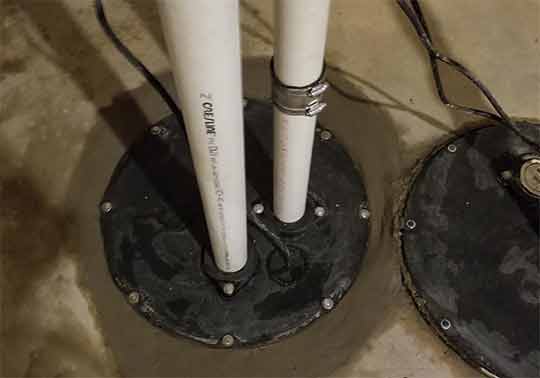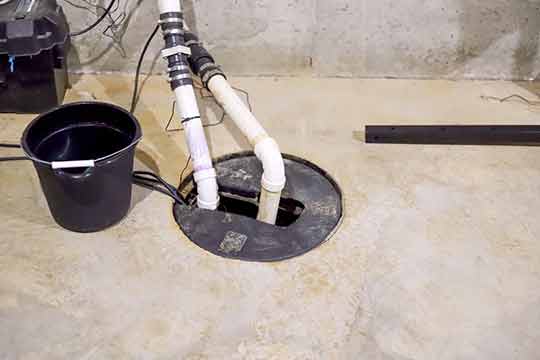Basements are a valuable space in any home, providing additional living or storage areas. However, one of the most common issues that homeowners face with their basements is flooding. Basement flooding can cause significant damage to property and pose health risks due to the presence of sewage. To address this problem, sewage ejector pumps play a crucial role in preventing basement flooding.
Understanding Sewage Ejector Pumps
Sewage ejector pumps are devices designed to remove wastewater and sewage from the lower levels of a building, such as basements, where gravity drainage is not possible. These pumps are typically installed in a dedicated pit or basin, below the level of the drainpipes. When wastewater from various sources, such as toilets, sinks, and showers, enters the pit, the pump is activated and pumps the waste up and out of the basement, connecting it to the main sewer line.
One of the primary reasons sewage ejector pumps are installed is to prevent basement flooding. These pumps ensure that wastewater is efficiently and safely removed from the basement, reducing the risk of water damage and contamination. Let’s explore some of the key roles sewage ejector pumps play in preventing basement flooding:
1. Efficient Water Removal
Sewage ejector pumps are specifically designed to handle the solid and liquid waste found in wastewater. These powerful pumps can effectively remove large volumes of wastewater from the basement, ensuring it is swiftly and efficiently transported away from the property. By promptly removing excess water, the risk of basement flooding is significantly reduced.
2. Prevention of Backflow
Backflow occurs when wastewater flows back into the basement due to issues in the sewage system, such as a blockage or overload. This can happen during heavy rainfall or when the sewer system becomes overwhelmed. Sewage ejector pumps help prevent backflow by actively pumping wastewater out of the basement and into the sewer system, ensuring that water flows in the intended direction and doesn’t reverse its course, leading to potential flooding.
3. Protection Against Sinkhole Formation
If excess groundwater enters your basement due to heavy rain or improperly drained landscaping, it can weaken the soil beneath your foundation and lead to sinkhole formation. Sewage ejector pumps help mitigate this risk by removing any excess water before it seeps into the soil. By removing the water promptly, the pumps prevent soil destabilization, ensuring the structural integrity of your foundation remains intact.
4. Overall Home Safety
In addition to preventing basement flooding, sewage ejector pumps contribute to the overall safety of your home. Flooded basements can pose electrical hazards and promote mold and bacterial growth. By efficiently removing wastewater and preventing basement flooding, sewage ejector pumps minimize the potential for these hazards, creating a safer and healthier living environment.

To ensure the proper functioning of sewage ejector pumps and prevent basement flooding, regular maintenance is essential.
Maintenance and Considerations
To ensure the proper functioning of sewage ejector pumps and prevent basement flooding, regular maintenance is essential. Here are a few considerations to keep in mind:
- Schedule annual inspections and maintenance by a professional plumber to identify potential issues and ensure proper pump operation.
- Test the pump regularly by pouring water into the pit to verify that it activates and pumps the wastewater out of the basement effectively.
- Install a backup power source, such as a battery-powered backup or generator, to ensure the pump continues to function during a power outage.
- Avoid flushing items like diapers, paper towels, or other non-biodegradable materials, as they can clog the pump and impede its performance.
- Consider installing a high-water alarm system that alerts you if the water level in the pump pit rises above a safe threshold.
By following these maintenance tips and considering the necessary precautions, you can maximize the efficiency and lifespan of your sewage ejector pump, reducing the risk of basement flooding and ensuring its consistent performance over time.
Conclusion
Sewage ejector pumps play a vital role in preventing basement flooding by efficiently removing wastewater from basements where gravity drainage is not possible. These pumps effectively prevent backflow and protect against sinkhole formation, contributing to the safety and integrity of the home. Regular maintenance and considerations are essential to ensure the proper functioning of sewage ejector pumps. By investing in the installation of a sewage ejector pump and taking appropriate precautions, homeowners can safeguard their basements against flooding, promoting a secure and healthy living environment for their families.
